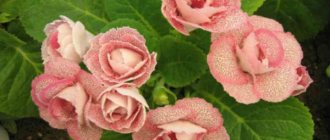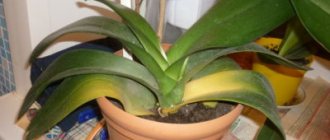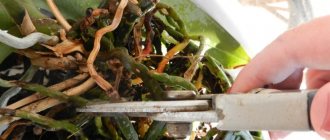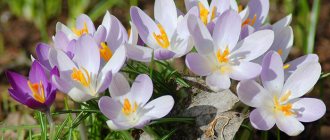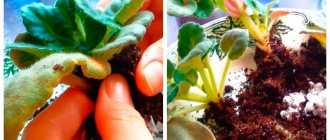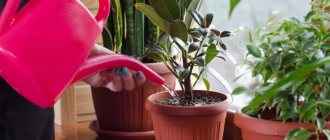Epiphany is a holiday that unites all Christians. Parishioners come to the church and to reservoirs with various containers to collect water, which, according to legend, becomes holy and healing. Usually people collect more holy water than they need, and by the end of the year, for the next Epiphany, they still have decent supplies left. The clergy do not recommend simply pouring out blessed water, and zealous owners often ask the question: “Is it possible to water flowers with holy water?” To find out the answer, you need to find out what this “living” liquid actually is, and what can happen if you water your plants with it.
Is it possible to water flowers with holy water?
Holy water
How to use holy water from last year
Holy water does not lose its beneficial power for a long time, and there is no reason to get rid of it. If the liquid has not spoiled, become cloudy or acquired a foul odor, then the water is calmly consumed internally for any need with prayer and reverence, and in emergency cases - daily. We must remember that holy water is a gift that is accepted with gratitude.
How to drink holy water correctly?
But if for some reason a person is afraid to consume precious moisture, then recommendations for using old consecrated water will help:
- Washing. Wipe your face with a small amount of water, preventing the liquid from entering the wastewater. The effects of agiasma are especially beneficial for sick and restless young children. It is not necessary to wipe your face; you just need to let the drops dry.
- Bathing. The Church does not forbid taking a bath with the addition of holy liquid only in exceptional cases, for sick and exhausted people, and only with the permission of the clergyman. For people who are healthy in spirit and body, it is enough to wipe their torso with their palms soaked in holy water after bathing in ordinary water.
- Last year's liquid can be poured over flowers. Sprinkling the bed and food of a sick person, wetting compresses and applying to places affected by illnesses.
- Use when watering indoor plants.
- Cross-shaped sprinkling of living and working premises, personal belongings or a car, accompanied by the reading of a prayer.
- Cleansing the home from negativity or in case of frequent quarrels among household members, combining agiasma, a church candle and saying a prayer.
- Sprinkling pets, protecting them from diseases with prayers. You should not give liquid to pets to drink; the animal will not be able to perceive water as a shrine.
- Anointing with water before making an important decision.
You should not collect blessed water for future use. You can always collect godly liquid at the nearest temple on any day.
[1]
Basic rules for watering plants
The moisture needs of plants are determined by their characteristic features, the structure of the stem and leaves, the power of the roots, etc. For example, plants with thick, fleshy leaves require significantly less moisture than those with large, thin leaves.
How to water plants correctly
If we talk about the general rules of watering, then gardening lovers need to remember the following:
- in bad weather, plants need to be watered less often than on clear days;
- When watering indoor flowers, you should pay attention to the air humidity in the room: if it is dry and warm, the plants will need more water, and if it is cold and humid, less;
- plants grown in light, loose soil are watered more often than those growing in dense, heavy soil;
- young, recently transplanted shoots require less moisture - their roots have not yet completely entangled the earthen ball, so the soil at the edges may begin to rot;
- adult plants with powerful, well-developed roots, as well as those that are in the period of active flowering, should be watered more abundantly;
- if flowers grow in pots made of non-porous material (plastic, metal), they need to be watered less and less frequently than those grown in ceramic containers, since in the first case the moisture evaporates from the containers much more slowly.
6 useful rules for watering plants
To determine whether flowers are suffering from over- or under-watering, you need to constantly monitor their condition. There are a number of signs that may indicate both a lack of moisture and its excess.
| Signs of insufficient watering | Signs of overwatering |
| Drooping leaves that have lost their shine and elasticity | Limp leaves with spots of rot; in some cases, leaves may droop, turn yellow and curl |
| Dried soil that crumbles easily in your hands | Constantly damp soil with mold |
| Quickly fading buds and flowers | Plant growth is too slow |
We collect consecrated baptism water correctly
If you decide to draw Epiphany water, then you must follow the following rules during this procedure:
- For this purpose, choose clean glassware without stickers.
- There is no need to pour too much water into the vessel. If you collect it for future use, it is considered a “shrine imprisonment” (without use) and will not act as it should.
- When receiving and transferring Epiphany water, you must not quarrel or use foul language.
This water is not used for various rituals and fortune telling. To preserve the miraculous properties of the liquid, you need to tighten the lid of the vessel tightly and store it next to the icons away from sunlight.
Archimandrite Spiridon (Khodanich) on the rules for storing Epiphany water:
Every pious Christian tries to save Epiphany water throughout the year, drinking it on an empty stomach, and there is no need to collect a huge amount: you can add a little consecrated water to a large container, and all the water becomes Epiphany under the influence of grace.
In case of illness, you must drink holy Epiphany water with prayer.
Epiphany water has the name “Great Agiasma”, which means “great shrine”, and you need to treat it accordingly - with reverence.
It is recommended to store Epiphany water in glass containers, in a place protected from light. The best place is in front of the home iconostasis. There is no need to put it in the refrigerator.
It is also unacceptable for holy water to get into the drain. It is unacceptable to keep water “in reserve” forever if it was brought from the temple once for Epiphany according to the principle “so that it is in the house, because everyone has it.” This is a kind of imprisonment of the shrine.
The grace of holy water does not decrease, no matter how long it is stored, but people who do not turn to the shrine are robbing themselves. It is best not to store water, but to share it with loved ones, neighbors and friends.
Space is to blame for everything...
Scientist Mikhail Vasilyevich Kurik (Ukraine), who was engaged in research on the state and properties of water, found out why it is on the Epiphany holiday that water becomes holy or bioactive, as scientists call it. The scientist decided to conduct an experiment: starting from December 22 and until the feast of Epiphany, he took water samples every day and observed how the structure changed and what happened to the liquid. As a result, Mikhail Vasilyevich concluded that water becomes unique due to the special influence of the energy fields of the Sun, Moon and planet Earth, as well as cosmic radiation and energy fields of other celestial bodies of the Solar system. Thus, the scientist was able to explain the unique properties of holy water from the point of view of the laws of nature.
The fact is that every year on the same day, January 19, our planet, together with the entire solar system, crosses the field of influence of special rays, a change in the gravitational fields in the space of the entire Galaxy occurs, as a result of which the bioenergy of water on Earth increases.
Holy water is believed to have healing properties
Research on holy water was also carried out by scientist Anton Belsky (Russia), who for a number of years on the eve of January 19 recorded active bursts of neutron flux in outer space - they exceeded background levels by more than 100 times! The maximum level of surges occurred from January 17 to 19 in different years. As a result of these influences, water is purified and charged with positive energy.
That is, even from the point of view of science, the existence of holy water is explainable, and this is not fiction or a biblical fairy tale. It is on January 18 and 19 that the Sun and our planet are positioned in such a way that a certain connection arises between the Earth and the central part of the galactic system. This connection forces everything around to interact and be structured on a completely different level.
On January 18-19, a connection arises between our planet and the central part of the galactic system. That's what one theory goes, at least.
Where can I pour it?
It is better to store the shrine next to the icons. The vessel with holy water is stored in a dark place, next to home icons. With respect, water retains its healing properties for a long time.
But if stored incorrectly, water can lose freshness and spoil (we described the reasons for this here). In this case, it would be correct to pour out last year’s water. However, there are certain places where liquid can be disposed of and where it should not be poured. Acceptable locations include:
- An untrodden place. It is allowed to use any piece of land where no person walks or where stray animals do not run.
- Open water. The best solution is to pour old holy water into a river or stream with a current.
- Dry well or drainage system at the temple. Draining is carried out with the permission of the priest.
It is considered unacceptable for consecrated moisture to come into contact with sewage - a sewer drain or a cesspool. Pouring liquid into a sink or toilet is considered extreme disrespect for something sacred.
When pouring water, you need to say words of gratitude for the time it was in the house.
[2]
For many centuries, holy water has given hope to praying people, strengthened faith and given strength. The healing properties are accepted and approved by the Church. A respectful attitude towards agiasma gives it great power, and it, in turn, helps in family and everyday situations.
The opinion of the priests
Priests of Orthodox churches prohibit pouring holy water anywhere, but they fully support the idea of watering indoor and garden plants with old water. If there are none, the holy liquid can be taken to the temple territory and poured there under a tree or bush. Some of it will evaporate, and some will absorb moisture from the plant.
On a note! By the way, you shouldn’t even wash your face with holy water over a sink; it’s better to do it over a flower. It is not good if the shrine ends up in the sewer. And in the territories of some temples there are also special wells into which old holy water can also be poured with the permission of the priest.
Is it permissible to place a container of Epiphany water on the floor?
Blessed water is sacred, just like other church paraphernalia, it must be respected. Sinners walk on the floor or on the ground. Therefore, it is not recommended to place a container of water on the floor, so as not to desecrate the shrine. Otherwise, the healing properties will be lost.
Before you put Epiphany water into a vessel, you need to first think about where to put it after returning home. Only in the temple can you put the bottle on the floor. In other places it is not recommended to do this, and if you have to, it won’t be for long.
Is it permissible to use a shrine when preparing food?
When preparing food, adding Epiphany water to food is not allowed. Moreover, it is unacceptable to pour it into tea, it is considered a sin. The desire to eat and communicate with the Lord are incompatible. However, sprinkling food with prayer is permitted.
Hand training helps: causes and prevention of “mouse” hand
Vertical flower bed made of PET bottles: a great idea for a small summer cottage
The common people left the city: how the inhabitants of Ancient Rome retained their rights
Is it possible to take medications with Epiphany water?
Many believers think that if they drink medicine with consecrated liquid, it will enhance the effect of the medicine, which will lead to a quick cure.
The clergy do not prohibit taking tablets with Epiphany water, but they also do not give a positive answer to this.
If at the time of taking the tablets the parishioner does not have plain water on hand, he can wash them down with consecrated liquid. However, in other situations it is better to refrain from this.
Interesting video
Epiphany is a holiday that unites all Christians. Parishioners come to the church and to reservoirs with various containers to collect water, which, according to legend, becomes holy and healing. Usually people collect more holy water than they need, and by the end of the year, for the next Epiphany, they still have decent supplies left. The clergy do not recommend simply pouring out blessed water, and zealous owners often ask the question: “Is it possible to water flowers with holy water?” To find out the answer, you need to find out what this “living” liquid actually is, and what can happen if you water your plants with it.
Is it possible to wash your face with holy water?
You can wash your face with holy water - that is, take a little into your palm and wipe your face. But there is no need to wash your face with holy water, as if it were water in a washbasin, splash it in all directions and pour the excess into the sink. This is a shrine, and it should be treated with care.
We need to wash ourselves with holy water not in order, for example, to “remove damage” (as people sometimes think), but in order to come into contact with the source of God’s grace given to us.
Is it possible to wash a child with holy water?
You can wash your child with holy water by gently rubbing a small amount over his face. But this should be done not “from the evil eye,” as parents sometimes think, but with faith that holy water gives us the opportunity to come into contact with God’s grace.
Is it possible to wash an unbaptized person with holy water?
It is possible to wash an unbaptized person with holy water. Anyone who believes in its beneficial effects, but who does not treat holy water as some kind of amulet, can drink or anoint themselves with holy water. Holy water is not a magical medicine, but a shrine, which, if a person himself strives for God, can give him some support on this path.
Epiphany water and animals
Scripture says that animals should not touch holy water. Therefore, people should not give this type of water to their pets. The exception is when the pet is facing a dangerous disease and the owner hopes that the shrine will help in this case. A few drops of consecrated water are added to the animal’s drink. Only the faith of the pet owner will definitely help here.
How is holy water used?
Christians can use holy water in several ways and for several purposes. It is advised to drink it a little every morning after prayer during illness. She is also regularly sprinkled on the house, food, and various objects, such as icons. You should only collect water for Epiphany in clean jars so that no debris or dirt gets into it. Holy water should be stored at home in the Red Corner next to the icons. And on the lid you can write the year when it was collected. It is customary to share excess water with family and friends who, for some reason, were unable to collect it themselves - in this case, there is no need to skimp.
Since holy water does not spoil, it can last for more than one year. But many do not dare to drink it and do not even use last year’s drink. At the same time, under no circumstances should old water be poured into the toilet, sink, or thrown out onto the street. In this regard, many try to use it for other good purposes - for example, sprinkling pets or watering flowers.
